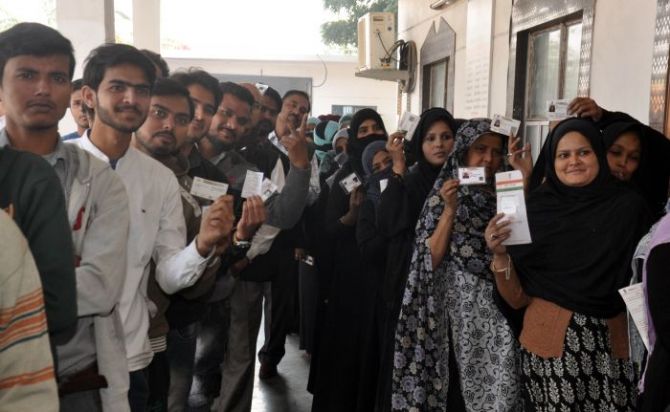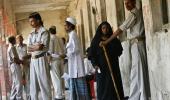
Lucknow voters on Sunday cast ballots to elect their first woman mayor in the ongoing civic body polls in Uttar Pradesh which already has the distinction of giving the country its first woman governor and chief minister.
As many as 23,27,900 voters are eligible to exercise their franchise in 2,201 polling booths, Lucknow District Magistrate Kaushal Raj Sharma said.
As the exercise to choose the first woman mayor in 100 years was in progress, enthusiastic voters queued outside polling stations, enjoying a mellow sunshine on a wintry Sunday afternoon.
All the parties fielded women candidates after the Lucknow mayoral seat was reserved for women.
Prominent contestants in a field of 19 are Sayukta Bhatia (Bharatiya Janata Party), Prema Awasthi (Congress), Bulbul Godiyal (Bahujan Samaj Party), Priyanka Maheshwari (Aam Aadmi Party) and Meera Vardhan (Samajwadi Party).
Uttar Pradesh is credited with giving the country its first woman governor Sarojini Naidu and chief minister Sucheta Kriplani.
Now, the City of Nawabs is poised to break the glass ceiling by electing its first woman mayor since the Uttar Pradesh Municipalities Act came was notified way back in 1916.
"Our time has come," feels Bhatia, while the BSP nominee says, "Better late than never".
Vardhan is the kin of educationist Acharya Narendra Dev, while Awasthi is the wife of the late Congress legislator Surendra Nath.
Lucknow figured in the second leg of the three-phase municipal elections across the state.
The Uttar Pradesh Municipalities Act came into being in 1916 and Barrister Syed Nabiullah became the first Indian to head the local body.
In 1948, the UP government changed the electoral nature of the local body and introduced the concept of administrator and Bhairav Datt Sanwal (ICS) was appointed to the post.
In 1959, the UP Municipalities Act, 1916, was replaced by the Uttar Pradesh Municipal Corporation Act, paving the way for the formation of the municipal corporation (nagar mahapalika) in Lucknow on February 1, 1960.
It was on the intervention of the Allahabad high court in 1989 that the government announced local bodies polls.
An amendment in the Constitution accorded the status of municipal corporation to Lucknow's local body retrospectively from May 31, 1994.
Provisions were made in the Municipality Act of 1959 to allow citizens to elect a mayor. Provision of reservation to women, SCs, STs and OBCs was also made on a rotational basis.
Kriplani, who had come to the forefront during the Quit India Movement in 1942, held the chief minister's office from 1963 to 1967.
She had worked closely with Mahatma Gandhi during the Partition riots. She was one of the few women who were elected to the Constituent Assembly and was part of the sub-committee that drafted the Constitution.
Naidu, popularly known as the 'Nightingale of India', was the governor of the United Provinces, now known as Uttar Pradesh, from 1947 to 1949.
She was born in a Bengali family on February 13, 1879 in Hyderabad and was educated in Chennai, London and Cambridge.
Naidu too was a follower of Mahatama Gandhi and had participated in the freedom struggle. She, later, went on to become the president of the Indian National Congress.
Lucknow has thrice sent a woman to the Lok Sabha as its representative with Sheila Kaul being elected in 1971, 1980 and 1984.
Rajnath Singh, Dinesh Sharma cast votes in 2nd phase
Union minister Rajnath Singh and Uttar Pradesh Deputy Chief Minister Dinesh Sharma on Sunday cast their votes in the second phase of the civic polls, polling for which was conducted in 25 districts.

The fate of the candidates would be decided by 1.3 crore voters in the districts of Lucknow, Varanasi--Prime Minister Narendra Modi's constituency, Allahabad, Mathura, Muzaffarnagar and Etawah among others.
In the state capital, Rajnath Singh cast his vote along with his wife and family members, including son Pankaj Singh who is a legislator.
Sharma voted with his wife in Aishbagh area and said, "The BJP is committed to work for the people and opposition should realise that it was the people's love and trust which ensured the party's victory in the assembly polls. In civic polls too, the party is going to win."
State Election Commissioner SK Agarwal also exercised his franchise and appealed to the people to cast their votes.
"If you want basic amenities in your city, you should come out of your home and vote in large numbers," he said.
Besides them, state ministers Swati Singh, Mohsin Raza and others prominent personalities cast their votes in the first four hours.
The voting would continue till 5 pm. While the polling for first phase was held on November 22, the last and final phase would be held on November 29.
The counting would be held on December 1.
Photographs: Sandeep Pal









